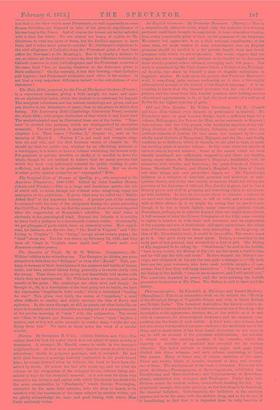Old and New London. By Walter Thornbury. Vol. II. (Cassell
and Co.)—This volume even exceeds its predecessor in interest. Mr. Thornbury takes us past London Bridge, itself a sufficient topic for a volume, Billingsgate, the Tower, the Mint, as far eastwards as Stepney; then returns into the City proper, with incidental mention of the out- lying districts of Moorfields, Finsbury, Islington, and what were the northern suburbs of London till that name was usurped by the once wholly rural districts of Hampstead, Highgate, and the like ; and finally conducts us to Holborn, which he intends, WO are glad to hear, to make the starting-point of another volume. In this route there are objects of interest almost beyond number. Some of the names which we have already mentioned are sufficiently suggestive, and there are besides, among many others, St. Bartholomew's Hospital ; Smithfield, with its memories, both terrible and ludicrous ; the great Schools of Charter- house, Merchant Taylors', and Christ's Hospital ; the Inns of Court, and other things quce nunc perscribere long= est. Mr. Thornbury's industry as a collector of anecdote, personal and historical, of anti- quarian details, and of the vast variety of matters which fall within the province of the historian of Old and New London is great, and he has a literary power and skill in grouping and describing which do not always go with industry. In fact, ho has made about. as readable a volume as we have ever had the good-fortune to fall in with, and a volume, too, with as little offence in it as might be, seeing that he has to touch, though it be but to touch lightly, many somewhat perilous things. Sometimes, perhaps, he is reticent beyond what one might have wished. A full account of what the Livery Companies of the City, some seventy or eighty in number, do with their vast revenues, and an explanation of the purpose and use of institutions still more mysterious—the minor Inns of Courts—would have been very interesting. As for giving an idea of Mr. Thornbury's book, it would be impossible. The reader must go to it. One good story we must quote. Haines, a comedian in the early part of last century, was arrested for a debt of .£20. The Bishop of Ely happened to be riding by. "Gentlemen," he said to the bailiffs, "here is my cousin, the Bishop of Ely ; let me but speak a word to him, and he will pay the debt and costs." Haines stopped the bishop's car- raige, and whispered in his ear (he was quite a stranger) :—"My lord, here are two poor waverers, who have such terrible scruples of con- science that I fear they will hang themselves." "You two men," called the bishop to the bailiffs, "come to me to-morrow, and I will satisfy you." The comedian departed in peace, and the next morning the bailiffs presented themselves at Ely Place. The Bishop is said to have paid the money.


































 Previous page
Previous page